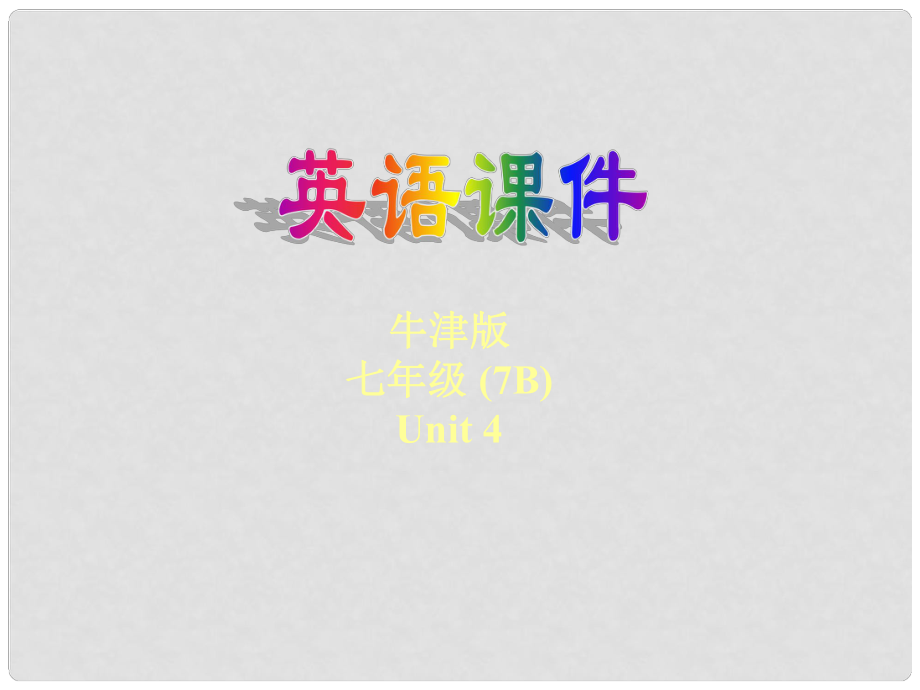《江蘇省大豐市萬(wàn)盈二中七年級(jí)英語(yǔ)下冊(cè)《Unit 4 Amazing Grammar 1》課件 牛津版》由會(huì)員分享�����,可在線閱讀���,更多相關(guān)《江蘇省大豐市萬(wàn)盈二中七年級(jí)英語(yǔ)下冊(cè)《Unit 4 Amazing Grammar 1》課件 牛津版(30頁(yè)珍藏版)》請(qǐng)?jiān)谘b配圖網(wǎng)上搜索�。
1��、牛津版牛津版七年級(jí)七年級(jí) (7B)Unit 4Unit 4Grammar ( two periods ) RevisionTalk about your preferences of some activities:Simple past tense(一般過(guò)去時(shí)一般過(guò)去時(shí))Simple past tense (一般過(guò)去時(shí)一般過(guò)去時(shí)):1. We use the simple past tense to talk about things in the past. 我們用一般過(guò)去時(shí)談?wù)摪l(fā)生在我們用一般過(guò)去時(shí)談?wù)摪l(fā)生在過(guò)去的事情�。過(guò)去的事情。 went 是是go 在一般進(jìn)去時(shí)中所用的在一般進(jìn)去時(shí)中
2�����、所用的動(dòng)詞形式動(dòng)詞形式, 是是go 的過(guò)去式��。的過(guò)去式����。 Yesterday morning, they went there again. 昨天早晨昨天早晨, 他們又他們又去了去了那�����。那���。2. We form the simple past tense by adding -ed to regular verbs. 我們通過(guò)在規(guī)則動(dòng)詞末尾加我們通過(guò)在規(guī)則動(dòng)詞末尾加 ed 的方的方式構(gòu)成一般過(guò)去時(shí)。式構(gòu)成一般過(guò)去時(shí)�。提示:一般過(guò)去時(shí)常與表示過(guò)去的提示:一般過(guò)去時(shí)常與表示過(guò)去的時(shí)間狀語(yǔ)連,如:時(shí)間狀語(yǔ)連����,如:yesterday, last night, a month ago, yesterda
3、y afternoon, last week, ten years ago 1 絕大多數(shù)動(dòng)詞絕大多數(shù)動(dòng)詞+edwalkwalked2以以e 結(jié)尾的動(dòng)詞結(jié)尾的動(dòng)詞+dlivelived3以輔音字母以輔音字母+y 結(jié)結(jié)尾的動(dòng)詞尾的動(dòng)詞變變y為為i+edcrycried4以一個(gè)元音字母以一個(gè)元音字母+一個(gè)輔音字母結(jié)一個(gè)輔音字母結(jié)尾的短動(dòng)詞尾的短動(dòng)詞雙寫末雙寫末尾的輔尾的輔音字母音字母+edstopstopped提示提示: 以元音字母以元音字母+y 結(jié)尾的動(dòng)詞結(jié)尾的動(dòng)詞按第一條規(guī)則���,即:按第一條規(guī)則��,即:+ed, 如如: stay stayedwant talk like worry try stop
4���、 wanted talked liked worried tried stopped Complete Part A1 in writing.1 search _ 2 kick _ 3 start_ 4 answer _5 love _ 6 use _7 play _ 8 carry _9 chat _chattedsearchedkickedstartedansweredusedplayedcarriedloved 三��、不規(guī)則動(dòng)詞的過(guò)去式不是加三���、不規(guī)則動(dòng)詞的過(guò)去式不是加ed 構(gòu)成的構(gòu)成的, 需要我們記住它們�。不規(guī)則需要我們記住它們。不規(guī)則動(dòng)詞的過(guò)去式歸納起來(lái)有這樣幾種動(dòng)詞的過(guò)去式歸納起來(lái)有
5�、這樣幾種類型類型(見(jiàn)下表見(jiàn)下表):1與原形一樣與原形一樣, 沒(méi)沒(méi)有變化有變化cost-cost put-put 2改變了元音改變了元音write-wrote know-knew3改變了輔音改變了輔音make-made spend-spent4元音和輔音都變?cè)艉洼o音都變化了化了see-saw buy-bought Complete Part A2 in writing.1 went 2 got 3 gave 4 found 5 spent 6 saw 7 had不規(guī)則動(dòng)詞不規(guī)則動(dòng)詞表表Infinitive Past tenseam is wasare werebegin beganbreak
6、brokebring broughtbuild builtbuy boughtcan couldInfinitive Past tensecatch caughtcome camedo diddraw drewdrink drankdrive droveeat atefall fell1)肯定句:肯定句: 主語(yǔ)主語(yǔ)+謂語(yǔ)動(dòng)詞過(guò)去式謂語(yǔ)動(dòng)詞過(guò)去式 He heard a whisper. They went to the park again last Sunday. 四���、謂語(yǔ)動(dòng)詞為實(shí)義動(dòng)詞的一般過(guò)四��、謂語(yǔ)動(dòng)詞為實(shí)義動(dòng)詞的一般過(guò)去時(shí)的句子結(jié)構(gòu):去時(shí)的句子結(jié)構(gòu): 2)否定句:否定句: 主語(yǔ)主語(yǔ) +
7��、didnt +謂語(yǔ)動(dòng)原形謂語(yǔ)動(dòng)原形 I didnt go to the park yesterday morning. He didnt hear a whisper. They didnt find anything in the bushes. 3)一般疑問(wèn)句一般疑問(wèn)句: Did +主語(yǔ)主語(yǔ)+謂語(yǔ)動(dòng)原形謂語(yǔ)動(dòng)原形? Yes, 代詞代詞+did. / No, 代詞代詞+ didnt. Did you go to the park yesterday morning? Yes, I did. Did he hear a whisper? No, he didnt.Complete the se
8�����、ntences. Use the simple past tense of the verbs in brackets:1. Jordan _(play) basketball. He _ (not play) football.2. I _ (go) swimming last Sunday. But I_ (not go) shopping.playeddidnt playwentdidnt go123. My cousins _(enjoy) computer games last year. But they _(not enjoy) ball games.4. _ you _ (li
9���、ke) fish in the past?Yes, But he _ (not like) fish.enjoyeddidnt enjoylikedidnt likeDid Complete Part A3 in writing.1 Did 2 go 3 did 4 didnt 5 Did 6 see 7 saw 8 died 9 did 10 see 11 Did 12 tell 13 gave 14 Did 15 take 16 didnt五、含有五����、含有be 動(dòng)詞的一般過(guò)去時(shí):動(dòng)詞的一般過(guò)去時(shí): (am/ is was are- were)1)肯定句:肯定句: 主語(yǔ)主語(yǔ)+was/ wer
10、e I / He/ She / It was at home yesterday. You / We / They were at home yesterday.2) 否定句:否定句: 主語(yǔ)主語(yǔ)+was not ( wasnt) / were not (werent) I / He/ She / It wasnt at home yesterday. You / We / They werent at home yesterday.3) 一般疑問(wèn)句一般疑問(wèn)句: 主語(yǔ)主語(yǔ)+was not ( wasnt) / were not (werent) Was I / he/ she / it at h
11����、ome yesterday? Yes, I/ he / she was. No, I/ he/ she wasnt. Were you / we / they at home yesterday? Yes, you/ we/ they were. No, you/ we/ they werent.1. Dinosaurs _ (not be) first animals on Earth.2. There _ (be) hundreds of different kinds of dinosaurs.3. He _ (go ) Sunshine Town last year. 用所給動(dòng)詞的適當(dāng)
12����、形式填空用所給動(dòng)詞的適當(dāng)形式填空:werent werewent4. _ you _ (buy) any souvenirs yesterday?5. Dinosaurs _ ( not eat) grass.6. _ (be) he at home last Sunday?7. All animals _ (have) four legs. 8. One of students _ (enjoy) listening to ghost stories when he was a boy.Did buydoesnt eatWashaveenjoyedComplete Part B1 on page 68 & Part B2 on Page 69. 1. Remember the use of the simple past tense. 2. Prepare for the next lesson.
 江蘇省大豐市萬(wàn)盈二中七年級(jí)英語(yǔ)下冊(cè)《Unit 4 Amazing Grammar 1》課件 牛津版
江蘇省大豐市萬(wàn)盈二中七年級(jí)英語(yǔ)下冊(cè)《Unit 4 Amazing Grammar 1》課件 牛津版

